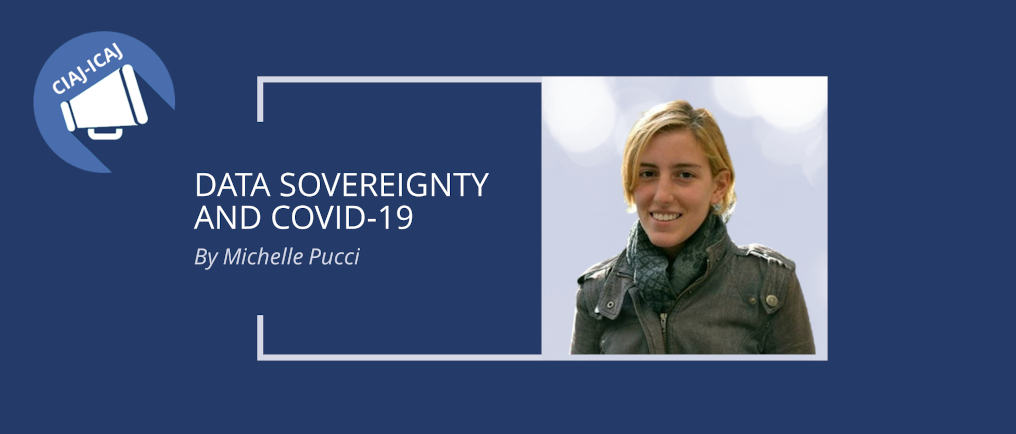Data Sovereignty and COVID-19

Back in March, the world was learning to cope with ever-changing restrictions on daily life. I tried to focus on passing my fourth semester of law school but could not help tuning in to daily press briefings by the Prime Minister, provincial premiers, and territorial health officers. (I was following the situation in Nunavut, where I had hoped to travel for work this summer.) It was early on in the crisis when Prime Minister Justin Trudeau said he wanted to avoid invoking the Emergencies Act.[1] I wondered: what laws exist to respond to the pandemic? Do First Nations, Métis and Inuit communities have a say? From there I began reading about emergency response management, particularly in the wake of environmental and climate disasters and ongoing public health crises like all-too-common “do not drink” advisories. I submitted a brief pap#_ftn1er as part of a class taught by Dr. Kerry Sloan, and later to the Canadian Institute for the Administration of Justice.
Many Canadians are still living in a state of emergency. Since the paper was submitted for the Christine Huglo Robertson Essay Prize, jurists have published far more thoughtful analyses of the pandemic’s effect on the vulnerable and constitutional obligations owed to Indigenous people. In two blog posts, I will review some of the articles published since April and consider two issues that call into question Indigenous-Crown relations and jurisdictions: control over data, and back to school measures. This first post focuses on the importance of data in emergency response management.
On Oct. 1, Indigenous Services Canada (ISC) reported 689 cases on First Nations reserves and in Inuit communities. Since the start of the pandemic response in Canada, First Nations and other communities have been requesting more information from the federal and provincial governments. For example, File Hills Qu’Appelle Tribal Council called for transparency on Facebook: seeking information about where people who test positive are living, and communication from the federal government about pandemic developments.
In May, the Yellowhead Institute reported higher numbers of COVID-19 cases and deaths of Indigenous people than those provided by Indigenous Service Canada. The under-reporting was attributed to (1) a lack of testing, (2) no disaggregated data from provincial health authorities (about race and ethnicity), (3) the patchwork of services that prevents accurate information gathering, and (4) ISC updates that do not report cases in half of the provinces. Off-reserve cases among First Nations people were being reported in Manitoba and Alberta. Before September, there were no on-reserve cases in Manitoba being reported.
Some health authorities cited privacy concerns as the reason for not specifying which reserves had active cases. And though provinces like Manitoba have data-sharing agreements with some leaders, these agreements do not include all governments. “We as First Nations are at the federal government’s mercy when it comes to data collection,” said Assembly of First Nations Manitoba Regional Chief Kevin Hart.
The number of positive cases among Indigenous people is disproportionately low, according to ISC.[2] This is a stark contrast from the fate of nations and tribes in the United States. Scholars in the US argue data sovereignty—the right to govern information about people and land—is necessary not only for taking appropriate action to respond to an emergency, but also to prevent “data terrorism”, in which governments threaten to withhold aid if Indigenous nations refuse to disclose private information about their members.
In Canada, research fellow Courtney Skye says the lack of data about COVID-19 cases among Indigenous people is proof that the federal and provincial governments do not care about their well-being. Accountability, transparency, and data are crucial to emergency response management. And yet disparity in reporting and broken lines of communications leave Indigenous leaders in the dark. “Non-disclosure to Indigenous governments perpetuates the historic social and legal stigma that Indigenous peoples, societies and legal orders are illegitimate,” wrote First Nations chief councilors in British Columbia.
[1] Emergencies Act, RSC 1985, c 22 (4th Supp).
[2] See also Jolene Banning, “Why are Indigenous communities seeing so few cases of COVID-19?”, CMAJ (24 August 2020), online: <https://www.cmaj.ca/content/192/34/E993>.

